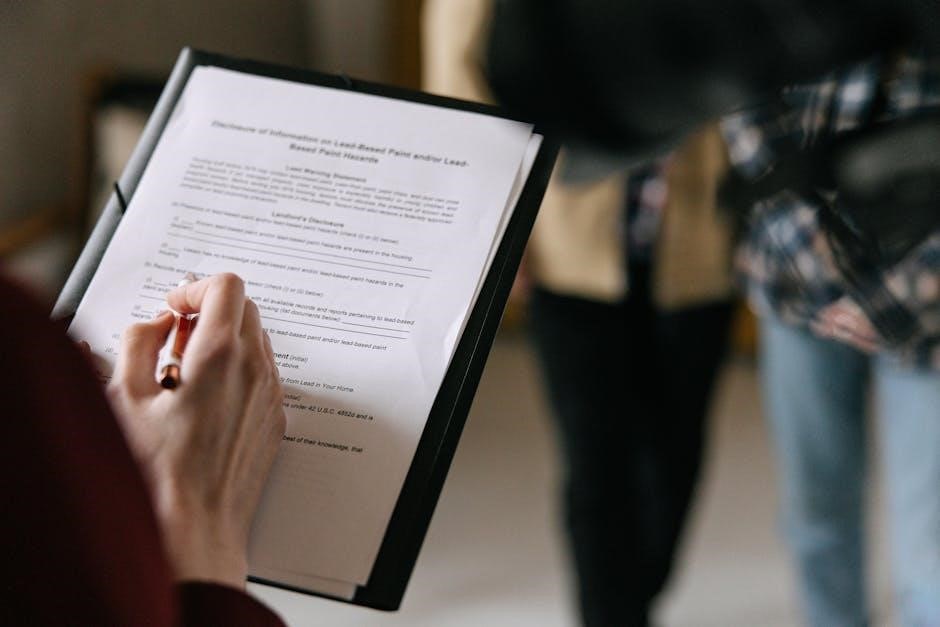A Massachusetts Lease Agreement is a legally binding contract between a landlord and tenant, outlining the terms and conditions for renting residential or commercial property․ It ensures clarity on rent, duration, and responsibilities, protecting both parties’ rights and obligations․
What is a Massachusetts Lease Agreement?
A Massachusetts Lease Agreement is a legally binding contract between a landlord and tenant that outlines the terms and conditions for renting residential or commercial property․ It is a fixed-term agreement that specifies the duration of the tenancy, the amount of rent, and the responsibilities of both parties․ This document is essential for establishing a clear understanding of the rental relationship and ensures compliance with Massachusetts state laws․ The lease agreement typically includes details such as the property address, lease duration, rent amount, security deposit, and rules for property use․ It also outlines the rights and obligations of both the landlord and tenant, providing a framework for resolving disputes and addressing potential issues․ Having a written lease agreement is crucial for protecting the interests of all parties involved and ensuring a smooth rental experience․ By defining the terms of the tenancy, it helps prevent misunderstandings and provides legal recourse if necessary․

Essential Elements of a Massachusetts Lease Agreement
A Massachusetts Lease Agreement must include key elements such as property details, rental terms, security deposit information, and signatures from both parties․ It should also outline tenant responsibilities, landlord obligations, and terms for lease termination or renewal․
Parties Involved
In a Massachusetts Lease Agreement, the parties involved are the landlord and the tenant․ The landlord is the legal owner of the property, while the tenant is the individual or entity renting the property for a specified period․ Both parties must be clearly identified in the agreement with their full names, addresses, and contact information․ The landlord is responsible for maintaining the property and ensuring it meets all legal and safety standards, while the tenant is obligated to pay rent, abide by the terms of the lease, and maintain the property in good condition․ In some cases, there may be multiple tenants, such as roommates, who are jointly and severally liable for fulfilling the lease obligations․ The agreement must also specify the legal capacity of both parties to enter into the contract, ensuring that they are of legal age and have the authority to do so․ By clearly defining the roles and responsibilities of both the landlord and tenant, the lease agreement provides a foundation for a mutually beneficial and legally binding relationship․ This section is crucial for establishing accountability and ensuring that all parties understand their duties under the agreement․
Rental Terms

The rental terms in a Massachusetts Lease Agreement outline the financial and temporal aspects of the tenancy․ The agreement specifies the monthly rent amount, the due date for payments, and the acceptable methods of payment, such as checks, electronic transfers, or online platforms․ It also details any late payment fees or penalties if the tenant fails to pay rent on time․ The lease duration is clearly stated, whether it is a fixed-term lease (e․g․, one year) or a month-to-month arrangement․ For fixed-term leases, the start and end dates are included, along with provisions for renewal or termination․ Rent increases, if applicable, must be communicated in writing within the timeframe required by Massachusetts law․ The agreement may also include terms regarding utilities, parking, and other services provided by the landlord․ These terms are non-negotiable once the lease is signed, ensuring both parties are bound by the agreed-upon conditions․ Clarity in the rental terms helps prevent disputes and ensures a smooth landlord-tenant relationship throughout the lease period․

Security Deposit

A security deposit is a common feature of Massachusetts lease agreements, serving as protection for landlords against potential damages or unpaid rent․ The deposit is typically refundable at the end of the tenancy, provided the tenant fulfills all lease obligations․ Massachusetts law limits the maximum security deposit to one month’s rent and requires landlords to provide a written receipt acknowledging the deposit․ The deposit must be stored in a separate, interest-bearing bank account, and tenants are entitled to receive interest on their deposit annually if the tenancy exceeds one year․ Upon lease termination, landlords must return the deposit within 30 days after the tenant vacates the property, deducting only for unpaid rent, damages, or necessary repairs․ Tenants should ensure they document the property’s condition at move-in and move-out to avoid disputes over deductions․ Failure to comply with these regulations can result in penalties for landlords, emphasizing the importance of adhering to state-specific guidelines․ Clear terms regarding the security deposit in the lease agreement help safeguard both parties’ interests and promote a fair rental process․

Types of Lease Agreements in Massachusetts
Massachusetts lease agreements are primarily categorized into residential and commercial types․ Residential leases govern tenant occupancy in apartments or houses, while commercial leases pertain to business spaces․ Each type addresses specific terms tailored to the property’s intended use․
Residential Lease Agreement
A Massachusetts Residential Lease Agreement is a fixed-term contract between a landlord and tenant for residential property․ It outlines the rental amount, lease duration, security deposit, and responsibilities of both parties․ The agreement ensures compliance with Massachusetts landlord-tenant laws, protecting both parties’ rights․ Tenants are guaranteed safe and habitable living conditions under the state’s strict housing codes․ Landlords must disclose lead paint risks, provide written notifications for rent increases, and adhere to eviction procedures․ The lease also specifies rules for subletting, pets, and property maintenance․ It serves as a legally binding document, preventing disputes by clearly defining expectations․ Customizable templates are available to suit specific needs, such as apartments, single-family homes, or room rentals․ Proper execution ensures clarity and mutual understanding, fostering a smooth tenancy experience in Massachusetts․
Commercial Lease Agreement
A Massachusetts Commercial Lease Agreement is a contract between a landlord and a business tenant for the rental of commercial property․ It is typically more detailed than a residential lease, as it addresses the unique needs of business operations․ The agreement outlines the terms of the tenancy, including rent, lease duration, property use, and responsibilities for maintenance and repairs․ Commercial leases often include provisions for rent escalation, parking, signage, and common area maintenance (CAM) fees․ Unlike residential leases, commercial agreements may allow for more flexibility in negotiating terms, such as build-out requirements or exclusive use clauses․ Massachusetts law requires landlords to disclose environmental hazards like lead paint or asbestos․ Tenants must also comply with local zoning and business regulations․ The lease must be in writing and signed by both parties to be enforceable․ Consulting a legal expert is recommended to ensure the agreement complies with state laws and protects the interests of both parties․ This document is crucial for establishing a clear and legally binding relationship between landlords and commercial tenants in Massachusetts․

Legal Requirements for a Massachusetts Lease Agreement


A Massachusetts Lease Agreement must comply with state and federal laws to ensure legality and enforceability․ Key legal requirements include disclosing lead paint hazards in properties built before 1978, as mandated by Massachusetts General Law Chapter 111, Section 197A․ Landlords are also required to provide a written rental agreement, even for oral leases, under Massachusetts General Law Chapter 186, Section 1․ Security deposit laws are strictly regulated, with landlords required to pay 5% annual interest on deposits and return them within 30 days of tenancy termination․ Additionally, landlords must maintain habitable living conditions, adhering to the state’s warranty of habitability․ Rent increases must be disclosed at least 30 days in advance for month-to-month tenancies, and eviction proceedings must follow legal protocols under Massachusetts eviction laws․ The lease must also include specific clauses, such as the identities of the parties involved, a detailed description of the property, and terms for rent, utilities, and maintenance responsibilities․ Failure to comply with these requirements can result in legal consequences for the landlord․ Ensuring the lease meets all legal standards is essential to protect both parties’ rights and interests․

A well-crafted Massachusetts Lease Agreement is essential for establishing a clear and mutually understood relationship between landlords and tenants․ It serves as a legal safeguard, outlining the terms, responsibilities, and expectations for both parties․ By ensuring compliance with state-specific laws, such as lead paint disclosure requirements and security deposit regulations, the agreement protects the rights of all involved․ Tenants are assured of fair treatment and safe living conditions, while landlords are protected from potential disputes and financial losses․ A properly executed lease agreement fosters trust and accountability, making it a cornerstone of successful property rentals in Massachusetts․ Always ensure the document is customized to meet individual circumstances and adheres to local legal standards․ Consulting with legal professionals can further guarantee that the lease is enforceable and comprehensive․ Ultimately, a Massachusetts Lease Agreement is not just a formal contract—it’s a foundation for a harmonious and legally sound tenancy․